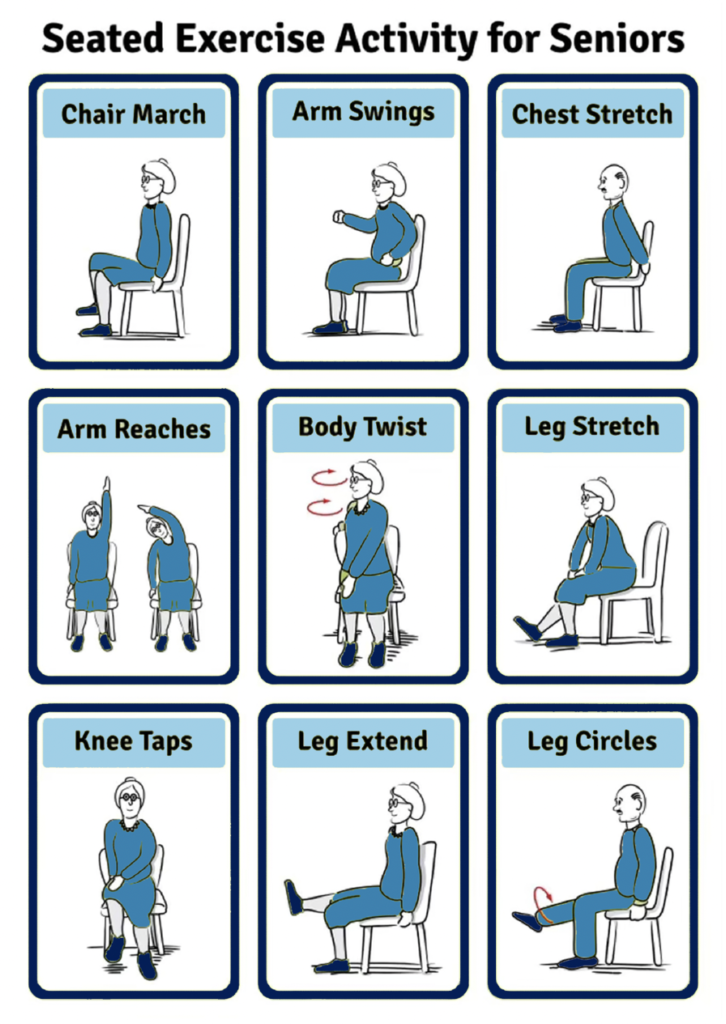Exercise For Seniors
Regular physical activity as part of your weekly routine is one of the most important things we can do for our health. Less pain, easier movement, better mood and lower risk of many diseases are some of the health benefits. You might need assistance and a tailored programme when you live with health conditions.
Exercise is a great, drug free way to improve your well-being and can reduce challenging behaviours which can arise in people with Alzheimer’s and dementia. Staying active can improve sleep, strength flexibility and blood circulation. Encouraging your loved one to exercise isn’t always easy. You want to be encouraging and create a fun atmosphere. Using another word instead of exercise could also work.
For some people group exercises is preferred as you are helping them, remember what they are doing but also not singling them out. The way, you and your carer can show the movements, slow the pace as needed and provide help. Seeing the people around them getting involved will motivate and make exercising fun.
It may take some time to find the types of exercises and the amount that works for them. Aim for the amount that makes them feel good, both physically and mentally. Start slow and build up slowly. Any amount of exercise is good so don’t push too hard as it can lead to injuries. Some people enjoy 10 minutes throughout the day and some like 30 mins all at once.

Safety tips :
- Before starting, check with the doctor to make sure that exercise is safe for their physical and cognitive conditions.
- Monitor the level of exertion by checking in with brief conversations. If they can speak without being short of breath, the pace is comfortable. If they can’t hold a conversation because they’re breathing too hard, slow the pace.
- Keep them hydrated with plenty of water before, during, and after exercising.
- For outside activities, make sure they’re wearing a medical alert bracelet, personal identification, and/or a GPS tracker in case they get separated from you.
- If they get dizzy, weak, or experience pain, stop immediately and rest. Talk to their doctor to find out if future exercise will be safe.
Being involved with your loved ones exercise may seem like another thing to fit into a packed day. Our carers can help with this during there selected time slot or through organising an extra hour which can be dedicated to getting your loved one moving.
Advanced
Dancing is a fun activity that does not feel like exercise! Play your loved one’s favourite music at home and lead them in a private dance party in the living room. Or, look for social events that include dancing at local community centres.
Class exercise - some gyms or community centres offer classes specifically designed for people with physical and mental disabilities.
Chair Exercise Circuit Classes, Chelmsford
- When? Fridays, 12:00am - 1:00pm
- Where? WI Hall, Springfield Green, Springfield, Chelmsford, Essex, CM1 7HR
- Telephone: 01376 408046
- Visit the Website
Forever fit - low impact intensity class designed for over 50s
- When? Weekdays, 10:00am - 11:00am
- Where? Chelmsford Sport and Athletics Centre, Salerno Way, Chelmsford, Essex, CM1 2EH
Young at Heart - group exercise class that aims to help people to improve their mobility, confidence and posture to aid in fall prevention
- When? Thursdays, 2:00pm - 3:00pm
- Where? Chelmsford Sport and Athletics Centre, Salerno Way, Chelmsford, Essex, CM1 2EH
Walking football at Chelmsford City Football club - visit the website
Swimming and water exercise is a great gentle way to strength muscles and improve flexibility. Check your local gym as they may have classes specifically designed for people with physical and mental disabilities.

